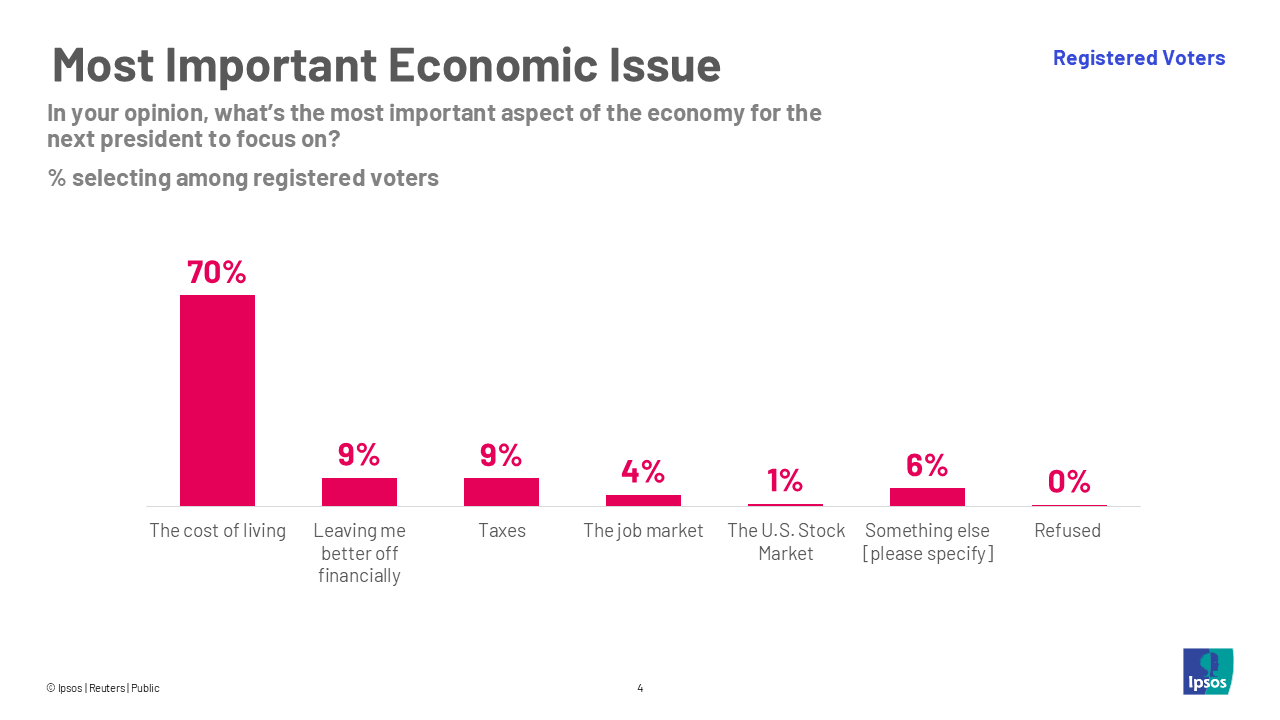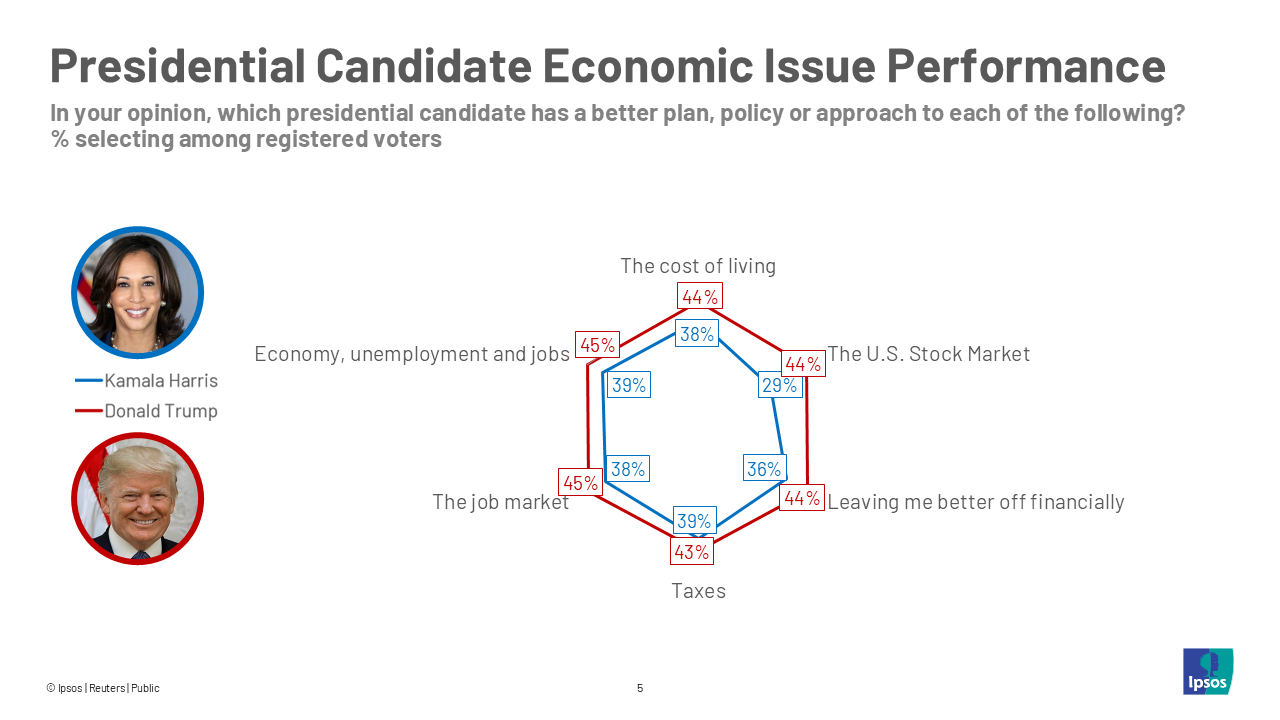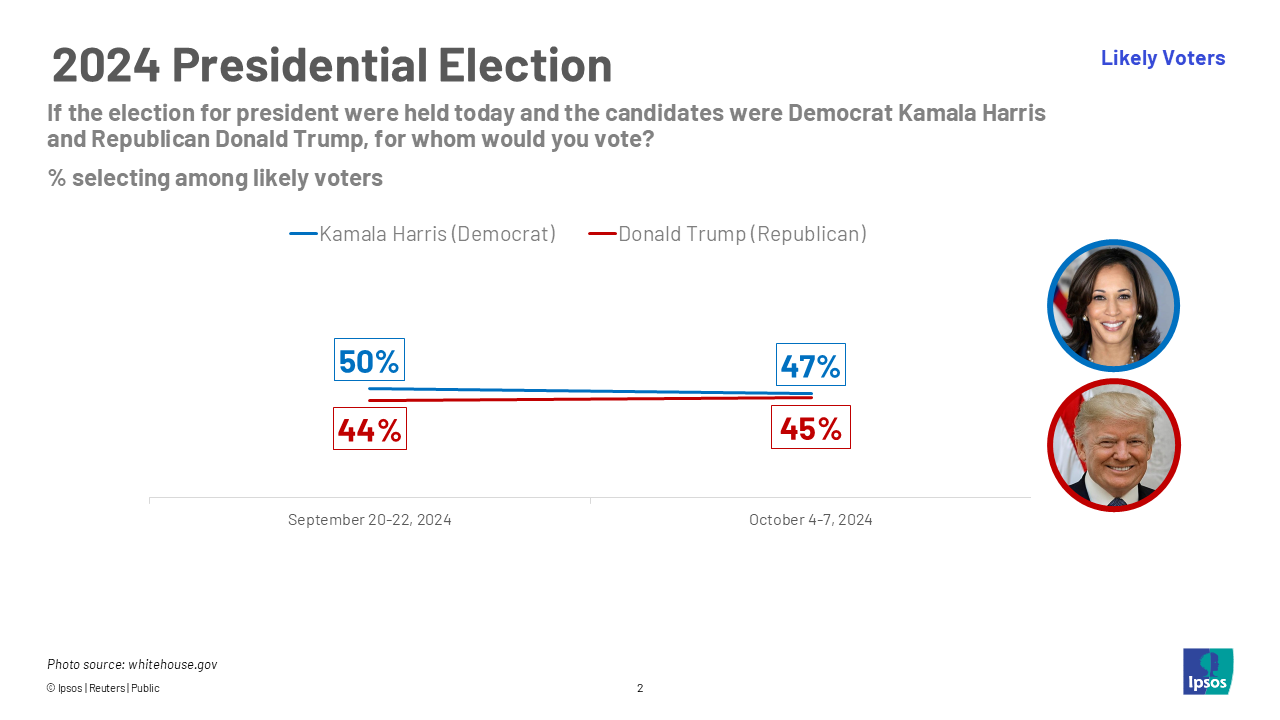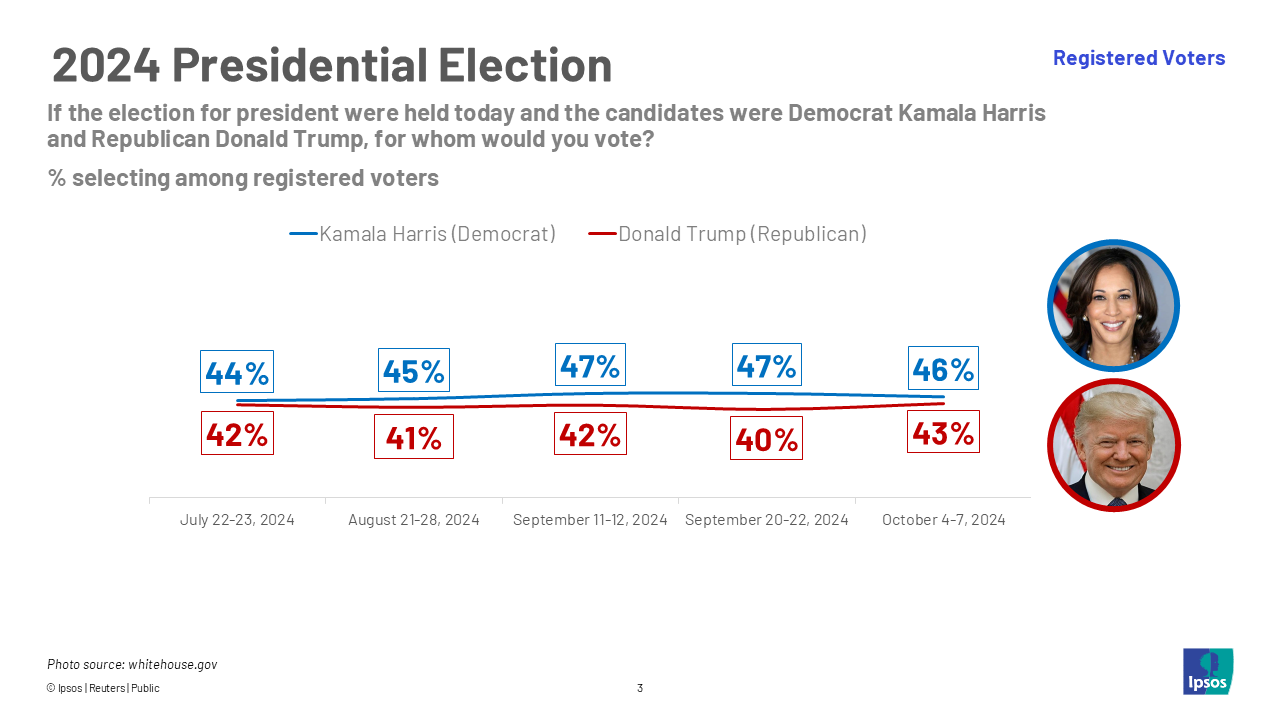Trump has small advantage on inflation, the #1 economic priority for Americans
Washington, D.C., October 11, 2024 – The latest Reuters/Ipsos poll finds that most likely voters think Vice President Kamala Harris represents a direct continuation of President Joe Biden’s policies. The poll also finds that a vast majority of Americans say the economy is important in determining their vote in the next election. Registered voters are more likely say they prefer former President Donald Trump’s approach to the economy than Harris’ approach. However, when it comes to the wealth gap, the second most important issue reported, registered voters are more likely to say they prefer Harris’ approach over Trump’s approach.
When asked about types of voter or election fraud, most likely voters say they are concerned about at least one issue. Two-thirds of likely voters say they are concerned about voter fraud by political actors hoping to sway the results of the election. Concerns around these types of voter or election fraud vary by political affiliation, but the majority across parties report concerns around organized voter fraud by political actors, voter intimidation, and voter suppression.
For more information about this study, please click here.
Detailed Findings
1. Most likely voters, regardless of party affiliation, agree Harris represents a direct continuation of Biden’s policies. Regardless, more registered voters agree Harris is mentally sharp and able to deal with challenges than Trump.
- Seven in ten (71%) likely voters agree Harris represents a direct continuation of Joe Biden’s policies. This majority sentiment is held across party affiliation, including 84% of Republican, 70% of independent, and 59% of Democrat likely voters.
- Fifty-six percent of likely voters say Harris is mentally sharp and able to deal with challenges. Just 47% of likely voters say the same about Trump.
- By party affiliation, independent likely voters are more likely to say Harris is mentally sharp than Trump (57% vs. 41%, respectively). Few Democratic likely voters (9%) say Trump is mentally sharp, and just one-fifth of Republican likely voters (19%) say the same of Harris.
2. Nearly all registered voters say the economy is important in determining their vote in the next election. A plurality of Americans prefers Trump’s approach to the economy over Harris’.
- Nine in ten (92%) registered voters say the economy or their personal economic situation is important in determining how they vote in the next election.
- The growing gap between the wealthy and average Americans (76%) is the second most important issue reported among registered voters.
- Registered voters are more likely to say they prefer Trump’s approach over Harris’ when it comes to the most important issue, the economy (Trump +8). However, registered voters prefer Harris’ approach to the wealth gap, the second most important issue (Harris + 7).
3. The majority of likely voters report concerns around voter or election fraud. These concerns, however, vary by party affiliation.
- Nearly nine in ten (88%) likely voters say they are concerned about at least one of the voter or election fraud issues asked about.
- Of all issues asked about, likely voters are most likely to report being concerned about organized voter fraud by political actors hoping to sway the result of the elections (66%). This majority concern is consistent across party affiliation; however, Republicans are more likely than Democrats or independents to report being very or somewhat concerned about organized voter fraud by political actors (83% vs. 53% and 63%, respectively).
- About three in five likely voters say they are concerned about voter intimidation (61%), voter suppression (60%), or vote buying (56%). Democrats are more likely than Republicans or independents to say they are concerned about voter intimidation or voter suppression. In contrast, Republicans are more concerned about vote buying than Democrats or independents.
- About half (48%) of likely voters report concern about large numbers of non-citizens voting in the November election. Most Republicans (84%) say they are concerned about this issue, but just 13% of Democrats say the same. Independents fall in the middle, as 45% report being very or somewhat concerned.
- However, just 38% of likely voters agree that large numbers of illegal immigrants are likely to vote in the November presidential election. Half of likely voters disagree, and 12% say they don’t know.
Washington, D.C., October 8, 2024 –The latest Reuters/Ipsos survey shows that most Americans agree that the cost of living is the most important economic issue for the next president to prioritize, and former President Donald Trump enjoys a slight edge over Vice President Kamala Harris on the issue. The survey also shows that Harris and Trump are locked in a tight race at the national level among likely voters.
Detailed Findings:
1. A quarter of Americans say the economy, unemployment and jobs (26%) is the most important issue facing America today, followed by political extremism and threats to democracy (17%) and immigration (16%). When it comes to economic issues, Americans believe that the next president should focus on the cost of living (69%), followed by a distant second and third place of “leaving me better off financially” (10%), and taxes (8%). The numbers are similar among registered voters, with 70% reporting that cost of living should be the priority for the next president, followed by leaving them better off financially (9%), and taxes (9%).

2. The survey explored which candidate Americans feel has a better plan or approach to these economic issues. Among registered voters, Trump is seen by more registered voters as having a better plan, approach or policy on economic issues than Harris: the U.S. stock market (+15 Trump), leaving Americans better off financially (+9 Trump), the economy U.S. generally (+9 Trump), the job market (+7 Trump), the economy, jobs, and unemployment (+6 Trump), the cost of living (+6 Trump), and taxes (+4 Trump).

3. On the ballot, the survey shows a tightening of the race among likely voters, moving from a small Harris lead in September (+6 Harris), to a statistical tie in early October. If the election for president were held today, Trump would receive 45% of the vote share among likely voters and Harris would receive 47% of the vote share at the national level.


About the Study
This Ipsos poll was conducted October 4-7, 2024, on behalf of Reuters using the KnowledgePanel®. This poll is based on a representative sample of 1,272 U.S. residents, age 18 or older.
The margin of sampling error is plus or minus 2.8 percentage points at the 95% confidence level, for results based on the entire sample of adults. The margin of error takes into account the design effect, which was 1.19 for all adults. The margin of sampling error is plus or minus 3.1 percentage points for registered voters and 3.2 percentage points for likely voters. In our reporting of the findings, percentage points are rounded off to the nearest whole number. As a result, percentages in a given table column may total slightly higher or lower than 100%. In questions that permit multiple responses, columns may total substantially more than 100%, depending on the number of different responses offered by each respondent.
The survey was conducted using KnowledgePanel, the largest and most well-established online probability-based panel that is representative of the adult US population. Our recruitment process employs a scientifically developed addressed-based sampling methodology using the latest Delivery Sequence File of the USPS – a database with full coverage of all delivery points in the US. Households invited to join the panel are randomly selected from all available households in the U.S. Persons in the sampled households are invited to join and participate in the panel. Those selected who do not already have internet access are provided a tablet and internet connection at no cost to the panel member. Those who join the panel and who are selected to participate in a survey are sent a unique password-protected log-in used to complete surveys online. As a result of our recruitment and sampling methodologies, samples from KnowledgePanel cover all households regardless of their phone or internet status and findings can be reported with a margin of sampling error and projected to the general population.
The study was conducted in English. The data were weighted to adjust for gender by age, race/ethnicity, Census region, metropolitan status, education, household income, and party ID. Party ID benchmarks are from the 2024 NPORS annual survey. The demographic benchmarks came from the 2023 March Supplement of the Current Population Survey (CPS).
For more information on this news release, please contact:
Chris Jackson
Senior Vice President, U.S.
Public Affairs
[email protected]
Annaleise Azevedo Lohr
Director, U.S.
Public Affairs
[email protected]
About Ipsos
Ipsos is one of the largest market research and polling companies globally, operating in 90 markets and employing over 18,000 people.
Our passionately curious research professionals, analysts and scientists have built unique multi-specialist capabilities that provide true understanding and powerful insights into the actions, opinions and motivations of citizens, consumers, patients, customers or employees. Our 75 solutions are based on primary data from our surveys, social media monitoring, and qualitative or observational techniques.
Our tagline "Game Changers" sums up our ambition to help our 5,000 customers move confidently through a rapidly changing world.
Founded in France in 1975, Ipsos has been listed on the Euronext Paris since July 1, 1999. The company is part of the SBF 120 and Mid-60 indices and is eligible for the Deferred Settlement Service (SRD).ISIN code FR0000073298, Reuters ISOS.PA, Bloomberg IPS:FP



